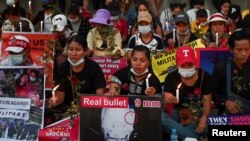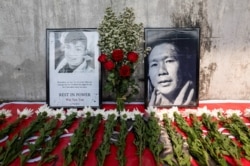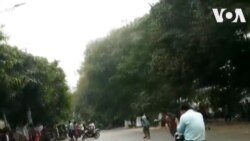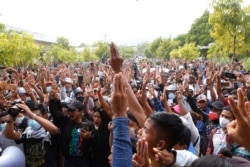Thousands of demonstrators took to the streets across Myanmar again Sunday, a day after two people were killed when police and security forces used live and rubber bullets, tear gas, water cannon and slingshots against those protesting the military’s February 1 coup.
U.N. Secretary-General Antonio Guterres condemned the deadly violence. "The use of lethal force, intimidation & harassment against peaceful demonstrators is unacceptable," he said on Twitter late Saturday.
Plans for more protests Monday persisted, with a call made Sunday for a general strike by a group called Gen Z along with the Civil Disobedience Movement. They called for people to come together for a “spring revolution” on the “Five Twos,” a reference to the digits in Monday’s date, 22/2/2021, and a nod to the 8888 pro-democracy uprising in Myanmar on August 8, 1988.
An internet shutdown Monday morning has been rumored in Myanmar, with the U.S. embassy among those warning people to be prepared for a blackout.
NetBlocks, which tracks internet disruptions and shutdowns, reported that in Myanmar “real-time network data show connectivity down to just 13% of ordinary levels as of 1 a.m. local time.” The nation was entering the second week of nightly internet shutdowns, the organization reported.
On Sunday, Facebook took down the main page of the Myanmar military, known as Tatmadaw, citing the firm’s policy of prohibiting the incitement of violence, Reuters reported.
A company spokesperson said in a statement that the page was removed “for repeated violations of our Community Standards prohibiting incitement of violence and coordinating harm.”
On February 11, Facebook announced it was limiting the distribution of all content from the military’s pages and profiles “in line with our global policies on repeat offenders of misinformation.”
Twenty people were wounded in Saturday’s violence, according to the head of a volunteer emergency service, and 569 have been detained in connection with the military takeover, the Assistance Association for Political Prisoners, an activist group, said.
Early Sunday, police arrested a famous actor, Lu Min, who had taken part in protests in Yangon and was one of six celebrities the army said were wanted under an anti-incitement law.
The army accused Lu Min of encouraging civil servants to join in the protest. If convicted, he faces a two-year prison sentence.
In a video posted on Lu Min’s Facebook page, his wife said police had come to their home in Yangon and taken him away.
"They forced open the door and took him away and didn't tell me where they were taking him. I couldn’t stop them. They didn’t tell me," Khin Sabai Oo said.
U.S. State Department spokesman Ned Price said the United States was "deeply concerned" by reports that security forces had fired on protesters and continued to detain and harass demonstrators and others.
Britain said it would consider further action against those involved in violence against protesters, and the French Foreign Ministry called the violence "unacceptable."
In a Twitter message, EU foreign policy chief Josep Borrell called on “the military and all security forces in #Myanmar to immediately stop violence against civilians.”
EU foreign ministers are to meet Monday to discuss possible sanctions.
The U.N.’s special rapporteur for Myanmar, Tom Andrews, tweeted, “I am horrified at more loss of life, including a teenage boy in Mandalay, as the ruling junta escalates its brutality in Myanmar. From water cannons to rubber bullets to tear gas and now hardened troops firing point blank at peaceful protesters. This madness must end, now!”
In a statement released late Sunday, Myanmar’s Foreign Ministry called the messages “flagrant interference” in its internal affairs.
“Despite facing the unlawful demonstrations, incitements of unrest and violence, the authorities concerned are exercising utmost restraint through minimum use of force to address the disturbances," it said in a statement.
But security forces have grown increasingly aggressive against the protesters, who have clashed with them since the military detained de facto leader Aung San Suu Kyi and other high-ranking officials of the civilian government nearly three weeks ago.
The military declared a one-year state of emergency, citing widespread fraud in last November’s general elections, won in a landslide by Suu Kyi’s National League for Democracy.
The military’s claims were rejected by Myanmar’s electoral commission.
Tens of thousands of demonstrators have since filled the streets of Myanmar’s biggest cities in defiance of a strict curfew and a ban on gatherings of more than four people, holding signs with pro-democracy slogans, many of them with pictures of Suu Kyi. They have raised a three-finger salute during marches, a sign of resistance against tyranny as depicted in the popular “Hunger Games” movies.
In addition to protests, government employees and civil servants are on strike, resulting in disruptions to train services throughout the country. The military has ordered civil servants back to work and threatened action against them. A growing number of workers from other sectors, including medical personnel, have walked off their jobs in recent days.
Senior Gen. Min Aung Hlaing, who led the coup, promised last week in a nationally televised speech that new elections would be held to bring what he called a "true and disciplined democracy,” but he did not specify when they would take place.









